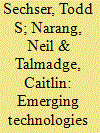|
|
|
Sort Order |
|
|
|
Items / Page
|
|
|
|
|
|
|
| Srl | Item |
| 1 |
ID:
167672


|
|
|
|
|
| Summary/Abstract |
Recent commentary has sounded the alarm about the effects of emerging technologies on strategic stability, yet the topic has received relatively little systematic scholarly attention. Will emerging technologies such as cyber, autonomous weapons, additive manufacturing, hypersonic vehicles, and remote sensing make the world more dangerous? Or is pessimism unwarranted? In this volume, we leverage international relations scholarship, historical data, and a variety of methodological approaches to discern the future implications of new technologies for international security. The findings suggest that new technologies can have multiple, conditional, and even contradictory effects on different aspects of strategic stability, and raise a host of important questions for future research.
|
|
|
|
|
|
|
|
|
|
|
|
|
|
|
|
| 2 |
ID:
115203


|
|
|
|
|
| Publication |
2012.
|
| Summary/Abstract |
Many scholars assume that nationalism is inherently aggressive without systematically exploring the relationship between nationalism and interstate war initiation. Thus, many questions are unanswered. Does nationalism increase the risk of war and if so, how? Which types of nationalism are most likely to trigger warfare? The author argues that nationalist persuasion campaigns produce several mechanisms that encourage conflict. Nationalism provokes "national enemies" and their foreign allies, generates biased strategic assumptions, creates domestic interest groups that favor war, permits the suppression of opposition groups, and promotes "nationalist bidding wars." When these processes exist, nationalism should increase the probability of war initiation. But, different forms of nationalism may not have similar effects. Using original data on the existence and type of state-level nationalism from 1816 to 1997, the author finds that nationalism significantly increases the probability of interstate war initiation. However, not all forms of nationalism are created equal in this regard.
|
|
|
|
|
|
|
|
|
|
|
|
|
|
|
|
|
|
|
|
|